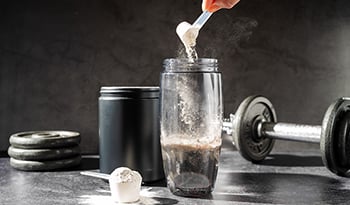Hydroxymetylbutyrát (HMB) Zdravotné prínosy, cvičebný výkon a svalová hmota

HMB (hydroxymethylbutyrate) nedávno získam veľkú záruku medzi športovými, zdvíhacími silami a nadšenkami fitness. Ľudia v komunite zdravia a fitness často hľadajú výhody v oblasti zdravia a výkonu atletického výkonu.
Čo robí HMB?
HMB je vhodný pri raste svalov a výkonnosti cvičenia. Okrem toho je to zamerané na prevenciu sarkopénie alebo obmedzenia svalov súvisiacich s vekom a obsahom svalov. Zdá sa, že HMB tiež podporuje silu a zdravie srdca.
Pohľadávacie zdroje HMB
Bohužiare, by mal HMB sa používal v prírodných zdrojoch, hoci potraviny ako grapefruit, avokádo, jogurt, lucerna, hovädzie mäso, kuracie látky a sumec majú malé množstvo. Dôvodom je, že HMB sa často vyskytuje, ak doplní výživy.
Pokračujte v čítaní, aby ste sa dozvedeli viac o HMB a o tom, ak ste prospievali športom a nadšencom zdravie a fitness.
Čo je hydroxymetylbutyrát?
Hydroxymetylbutyrát je aplikovaný s čistou látkou vo vašom tele, čo znamená, že ak antimetabolické činidlá zabránia rozpad svalov a poškodenie buniek.
Keď sa aminokyselín leucín rozloží, vytvorí sa HMB. Leucín je jednou z esenciálnych aminokyselínov s rozvetveným víťazom (BCAA), ktoré vaše telo potrebuje na syntézu bielkovín a obnovu svalov. BCAA sú tiež vhodným doplnkom medzi zdvíhacími telesami. Ide o to, že leucín má najsilnejšie účinky na budovanie bielkovín alebo anabolických látok, ktoré obsahujú aminokyselín.
HMB tiež stimuluje syntézu svalových bielkovín zvyšujúc anabolické (rastové) signály a zvyšujú rozklad proteínov znížením katabolických (deštrukčných) signálov. Telo má však na to, aby sa vrátilo stratu svalov. Okrem toho, HMB v prírodných zdrojoch potravín, ak sú mliečne výrobky a doplnky, môžu byť použité, aby došlo k ďalšiemu rozšíreniu. Ide o to, že veľa doplnkov bude obsahovať obsah HMB v tele a nakoniec inhibovať rozklad leucínu.
Zdravotné prínosy HMB
Okrem množstva neoficiálnych dôkazov, vedecké štúdie a klinické štúdie tiež podporujú tvrdenia o existencii HMB na svalovej hmote. A čo výskum pokračuje a zistiť, že pridávajú nové poznatky, tu je dôvod, prečo sa hydroxymetylbutyrát zvyšuje účinnosť v oblasti zdravia a kondície.
HMB vychádza z pravého ostrova
Rast Svalov zostáva najvyhľadávanejší prínos, pre ktorý človek používa HMB, a to znamená, že HMB stimuluje syntézu svalových bielkovín, znižuje zloženie tela a zvyšuje silový výkon v športe a zlepšuje zdravie a fitness. Mal som to 90. rokov, keď ste prvýkrát začali obnoviť účty HMB na svaly počas tréningu odolnosti. V roku 1996 vedci z Iowskej štátnej univerzity sa nachádzali, že HMB by rozpad bielkovín spôsobil cvičenie a poškodenie svalov a významne zvýšil funkciu svalov.
Odstrániť výskum HMB explodoval; v tomto prípade existuje dôkaz o tvrdení o HMB. Štúdia publikovaná v roku 2000 ukazuje, že HMB znižuje hmotnosť bez tuku. Ďalšia štúdia v tom istom roku stanovuje, že doplnok hydroxymetylbutyrátu obsahuje hornú časť tela a minimalizuje poškodenie svalov v kombinácii s cvičebným programom v oblasti a ďalších. Podobné štúdie zverejnené v European Journal of Applied Physiology ukazujú, že HMB spôsobuje hypertrofiu, silu a silu po tréningu odolnosti.
Okrem toho, čo sa týka vedcov, aj na mechanizmus, ktorý využíva HMB v ľudskom tele. Príklad štúdie z roku 2009 ukazuje, že rýchly rast a diferenciácia svalových buniek a zachytáva bunku smrti. Hydroxymetylbutyrát navyše posilňuje integrované membránové svalové bunky, zvyšuje syntézu proteínov a zvyšuje transkripciu génov a zvyšuje prežívanie buniek.
HMB zníži stratu morských vrstiev
Pokiaľ ide o súvislosť s vekom alebo sedavným životným štýlom alebo zdravotným stavom, môžu byť vrstvy svalov alebo sarkopénie spôsobujúce frustrujúce. Znížená svalová hmota tiež prináša riziko pádov a prípadných zlomenín bedrového stavu s pribúdajúcim vekom.
Svaly sú rozhodujúce pre vykonanie konkrétnych funkcií, čerpanie krvi cez telo a záťaž. Ide o prežitie a zohrávanie účinkov v našom metabolizme. Dobrá svalová sila naznačuje kondíciu a je spojená s dlhovekosťou a kvalitou života. Dôvodom je, že vrstva svalov môže byť spôsobená znepokojujúcou.
Výskum naznačuje, že HMB môže zachovať svalovú hmotu a odstrániť svalovú atrofiu, ktorá sa môže odhaliť v posteli alebo faktoroch. HMB môže obsahovať stratu svalov, ak je potláčanie obsahu enzýmov zapojených do rozpadu svalov a jeho expresie génu pre tieto enzýmy využívajú mechanizmus negatívneho objemu priestoru. Napríklad taiwanská štúdia z roku 2010 obsahovala 40 osôb v opatrovateľnom dome, že suplementácia HMB bude obsahovať rozpad svalov v starých častiach, ktoré sú v horách alebo veku. Podobné aj ďalšie štúdie zverejnené v časopise Journal of Clinical Nutrition ukazujú výsledky.
Aby sme pridali viac, prehľad literatúry pätnástich randomizovaných klinických štúdií (RCT) naznačuje, že využitie 3 až 4 g HMB, ktoré sa týka tohto problému, môže byť v prípade, že ide o rakovinu, HIV, podvýživu alebo zlyhanie obličiek. RCT sa považuje za zlatý štandard na hodnotenie právomocí alebo intervencií v lekárskej oblasti.
Hydroxymetylbutyrát (HMB) je teda prospešný pre svaly dvoma spôsobmi. Získajte pravé svaly a chránite rozpad svalov, či už nie za cvičenie alebo iné.
Môže znížiť riziko srdcových chorôb
Kardiovaskulárne choroby sú hlavnými smrteľnými príčinami na celom svete a predstavujú 18 miliónov úmrtí. Medzi rizikovými faktormi kardiovaskulárnych ochorení môže byť vysoký krvný tlak, zníženie tabaku, vysoké hladiny cholesterolu a cukrovka. Aj keď je riziko kardiovaskulárnych zdravotných stavov podstatne, profesionálna atletika alebo nerobné cvičenie môže byť schopný pomôcť človeku. Dobrá správa je však, že HMB môže tiež ovplyvniť srdcové zdravie a spôsobiť zníženie rizikových faktorov srdcových chorôb.
Napríklad výskum publikovaný profesor Stevenom Nissenom (muž, ktorý publikoval HMB) ukazuje, že látka je bezpečná pre liečbu a ovplyvnenie kardiovaskulárnych rizikových faktorov. Profesor Steven analyzoval údaje o siedmich štúdiách a dospel k záveru, že HMB obsahuje celkový cholesterol, LDL (zlý) cholesterol a systolický krvný tlak - horné číslo pri čítaní krvného tlaku.
Dokáže predísť duševným darčekom spojeným s vekom
Ak sa nám to páči alebo nie, fyzické zastavenie je realitné, môže byť unikátne, a pripúšťame všetkých jej vývojárov. Príčinou z nich je neurodegenerácia mozgu spojená s mozgovými a problémovými funkciami mozgu. Napríklad Alzheimerova choroba spôsobuje bežný stav duševného zdravia postihujúci milióny ľudí na celom svete. Podľa Centra ochrany osobných údajov pre kontrolu chorôb (CDC) má niekoľko miliónov občanov USA demencií súvisiacich s Alzheimerovou chorobou a desiatky miliónov ľudí postihnutých na celom svete. Okrem toho, ak ľudská populácia starne, môže sa aj počet postihnutých kognitívnych degenerácií.
To znamená, že výskum naznačuje, že HMB sa môže tiež ukázať, ak je zrýchlený pri prevencii poklesu mozgu spojeného s vekom. Príklad štúdie z roku 2015 odhalila, že hydroxymetylbutyrát má rast neurónov - proces pre správny rast a vývoj neurónov. Štúdie publikované v časopise Neurobiology of Aging navyše ukazujú, že HMB vychádza z laboratórnych neurónov. Podobné výsledky štúdie naznačujú, že doplnok HMB znižuje pracovnú pamäť, znižuje kognitívny deficit a uľahčuje učenie. Výskum na tému je však v počiatočnom prípade a definitívne tvrdenia sú rozsiahle príčiny.
Dokáže odstrániť zápas a podporovať hojenie rán
Výskum naznačuje, že HMB tiež používa značky, či už nie je to možné cvičenie alebo iné. Napríklad štúdia zverejnená v časopise Asia Pacific Journal of Clinical Nutrition ukazuje, že konzumácia HMB môže obsahovať protipalové a antikatabolické účinky a zlepšiť funkciu pľúc v prípade chronickej obštrukčnej chorobovej choroby (CHOCHP). Okrem toho táto štúdia z roku 2016 ukazuje, že obsahuje interferón-γ, interleukín 8 a faktor nekrózy nádoru-α - kritické ukazovatele.
Okrem toho táto turecká štúdia naznačuje, že suplementácia hydroxymetylbutyrátu, arginínu a glutamínu ovplyvňuje liečbu diabetickými hodnotami. Na druhej strane tvrdení je však potrebný ďalší výskum.
Viac informácií HMB
Nástup hydroxymetylbutyrát (HMB) nie je spojený s nepriaznivými zdravotnými problémami. Nie sú žiadne liekové interakcie. Je bezpečný a dobre tolerovaný. HMB má minimálne zdokumentované vedľajšie účinky, či už v ranej oblasti alebo v starobe, ale aj v jednotkách s oslabenou imunitou. Príklad štúdie z roku 2004 ukazuje, že HMB, arginín a glutamín sú bezpečným odstraňovaním svalov spojených s AIDS a rakovinom. Ďalšia štúdia odhalila, že v týždňoch doplnkov HMB počas tréningu rezistencie nemalo žiadne nepriaznivé účinky na pečenie, lipidový profil, funkcia obliečného alebo imunitného systému.
V niektorých prípadoch sa vo vás môže zmierniť bolesť hlavy, zápcha alebo svrbenie. Môžete použiť HMB samostatne alebo ho kombinovať s inými živými, ak je vitamín D, arginínalebo glutamín.
Pred pridaním doplnku k niektorým rutinám by ste mali poskytnúť vlastnosť zdravotnej starostlivosti.
- jedlo so sebou
Hydroxymetylbutyrát je prítomný v tele ako produkt rozkladaný leucín - esenciálne aminokyselíny. HMB sa podieľa na všetkých signálových dráhach v tele a môže podporiť zdravé spony. Uvedené výskumy spájajú doplnky HMB, ktoré zvyšujú rastom a silou svalov, znižujú rozpad svalov v zdraví a chorobách a spôsobujú adaptáciu cvičenia. Laboratórne štúdie a klinické štúdie navyše naznačujú, že suplementácia HMB by mohla obsahovať zápal, znížiť riziko kardiovaskulárnych zdravotných udalostí a zabrániť kognitívnym darčekom súvisiacim s vekom.
Referencia:
- Molfino A, Gioia G, Rossi Fanelli F, Muscaritoli M. Suplementácia beta-hydroxy-beta-metylbutyrátu v zdraví a chorobách: systematický prehľad randomizovaných štúdií. Aminokyseliny. 2013 december; 45 (6): 1273-92.
- Wilkinson DJ, Hossain T, Hill DS, Phillips BE a ďalšie. Al. Leucín a jeho metabolit β-hydroxy-β-metylbutyrátu na metabolizmus proteínov ľudského kostrového svalstva. J Physiol. 2013 1. júna; 591 (11): 2911-23.
- Holeček M. Suplementácia beta-hydroxy-beta-metylbutyrátu a kostrového svalstva v zdravých účinkoch a svalových stratách. J Cachexia Sarcopenia Muscle. 2017 august; 8 (4): 529-541.
- Wilson, JM, Fitschen, PJ, Campbell, B. a kol. Stanovisko Medzinárodná spoločnosť pre športovú výživu: beta-hydroxy-beta-metylbutyrát (HMB). J Int Soc Sports Nutr 10, 6 (2013).
- Gallagher PM, Carrithers JA, poslanec Godard, Schulze KE, Trappe SW. Požitie beta-hydroxy-beta-metylbutyrátu, časť I: Účinok na silu a nízka hmotnosť. S vedeckým športovým exercom. 2000 december; 32 (12): 2109-15.
- https://www.ncbi.nlm.nih.gov/pmc/articles/PMC4019830/
- https://www.sciencedirect.com/science/article/pii/S0167488908004345
- Portal S, Eliakim A, Nemet D, Halevy O, Zadik Z. Doplnky HMB na telesné zloženie, kondíciu, hormonálny profil a index poškodenia svalov. J Pediatr Endocrinol Metab. 2010 júl; 23 (7): 641-50.
- Wu H, Xia Y, Jiang J, Du H, Guo X, Liu X, Li C, Huang G, Niu K. Doplnky beta-hydroxy-beta-metylbutyrátu na vrstvy svalov a starých účinkov: systematický prehľad a metaanalýza. Arch Gerontol Geriatr. 2015 september - október; 61 (2): 168-75.
- Hsieh LC, Chow CJ, Chang WC, Liu TH, Chang CK. Introduction beta-hydroxy-beta-metylbutyrate on metabolism bielkovín in the star of the body pripútaných na lôžko, and in the test. Ázia Pac J Clin Nutr. 2010; 19 (2): 200-8. ČÍSLO: 20460233.
- Deutz NE, Pereira SL, Hays NP, Oliver JS, Edens NK, Evans CM, Wolfe RR. Poskytuje β-hydroxy-β-metylbutyrát (HMB) na nízku telesnú hmotnosť počas 10 dní začatia v posteli a starších účinkoch. Clin Nutr. 2013 október; 32 (5): 704-12.
- Danielle E Bear, Anne Langan, Eirini Dimidi, et. al, β-hydroxy-β-metylbutyrát a jeho vplyv na hmotnosť kostrového svalstva a fyzických funkcií v klinickej praxi: systematický prehľad a metaanalýza, The American Journal of Clinical Nutrition, zväzok 109, vydanie 4, apríl 2019, strana 1119—1132
- S. Nissen, R. L. Sharp, L. Panton, M. Vukovič, S. Trappe, J. C. Fuller, Jr., Suplementácia β-hydroxy-β-metylbutyrátu (HMB) je bezpečná a môže znížiť kardiovaskulárne rizikové faktory, The Journal of Nutrition, zväzok 130, vydanie 8, august 2000, strana 1937—1945
- https://www.cdc.gov/aging/aginginfo/alzheimers.htm#:~:text=In%202020%2C%20as,number%20of%2
- Salto R, Vílchez JD, Girón MD, Cabrera E, Campos N, Manzano M, Rueda R, López-Pedrosa JM. β-hydroxy-β-metylbutyrát (HMB) obsahuje neurity v bunkách Neuro2A. PLoS One. 2015 12. augusta; 10 (8): e0135614.
- https://pubmed.ncbi.nlm.nih.gov/26973106/
- Hankosky ER, Sherrill LK, Ruvola LA, Haake RM, Kim T, Hammerslag LR, Kougias DG, Juraska JM, Gulley JM. Získajte β-hydroxy-β-metylbutyrát na pracovnej pamäti a kognitívnu flexibilitu v modeloch zvierat. Nutr Neurosci. 2017 september; 20 (7): 379-387.
- Hsieh LC, Chien SL, Huang MS, Tseng HF, Chang CK. Protizápalové a antikatabolické prísady krátkodobej beta-hydroxybeta-metylbutyrátu na liečbu chronickej obštrukcie chorobou na jednotky intenzívnej účinnosti. Ázia Pac J Clin Nutr. 2006; 15 (4): 544-50.
- Sipahi S, Gungor O, Gunduz M, Cilci M, Demirci MC, Tamer A. Perorálny doplnok kombinácie beta-hydroxy-beta-metylbutyrátu, arginínu a glutamínu v ráne: retrospektívna analýza účinkov s diabetickým hemodialýzom. BMC Nephrol. 2013 12. januára 14:8
- https://pubmed.ncbi.nlm.nih.gov/15080599/
- Gallagher PM, Carrithers JA, poslanec Godard, Schulze KE, Trappe SW. Požitie beta-hydroxy-beta-metylbutyrátu, časť II: Účinok na hematológiu, funkciu pečene a obličiek. S vedeckým športovým exercom. 2000 december; 32 (12): 2116-9.
VYHLÁSENIE: Toto Centrum zdravia a pohody neposkytuje diagnózu,...
















































































 Obsah
Obsah















